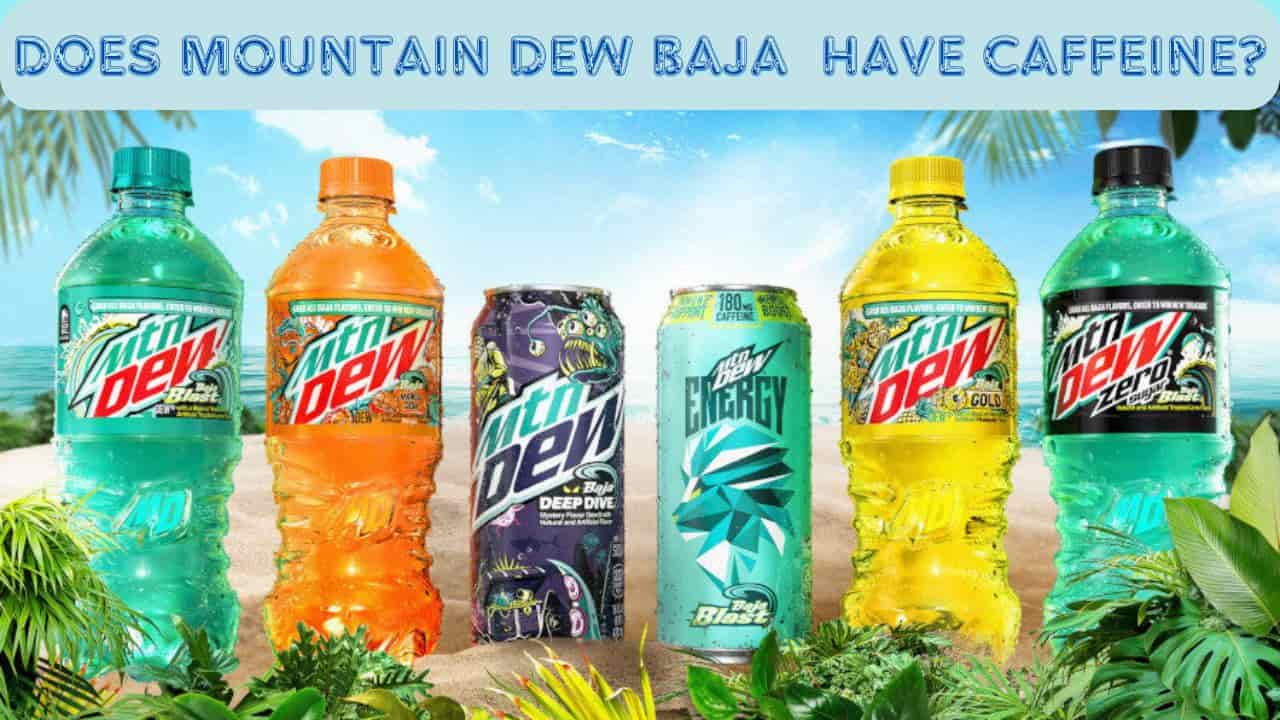Written By: Sherry Harris
If you’re a Mountain Dew Baja Blast fan, you’ve likely wondered: does it contain caffeine? The answer is yes, but let’s dive deeper to understand how much caffeine it has, its nutritional profile, and whether it’s a good choice for your daily routine.
Table of Contents
What Is Mountain Dew Baja Blast?
Mountain Dew Baja Blast is a tropical lime-flavored soda that has gained immense popularity since its introduction in 2004. Originally created exclusively for Taco Bell, it became a cult favorite among soda enthusiasts. Its vibrant turquoise color and unique flavor profile set it apart from other Mountain Dew varieties.
Today, Baja Blast is available in stores during limited-time promotions, making it a must-have for fans whenever it hits the shelves.
Does Mountain Dew Baja Blast have Caffeine?
Yes, Mountain Dew Baja Blast contains caffeine. A standard 12-ounce can have about 54 milligrams of caffeine. This amount is comparable to other Mountain Dew flavors but less than what you’d find in energy drinks or coffee.
For larger sizes, such as the 20-ounce bottle, caffeine content rises to approximately 91 milligrams. It’s essential to check the label if you’re monitoring your caffeine intake.
Comparison with Other Varieties
When comparing Baja Blast to other Mountain Dew varieties, its caffeine content is relatively standard. For instance:
- Mountain Dew Original: About 55 mg per 12 ounces.
- Mountain Dew Code Red: Similar levels to the original.
- Mountain Dew Zero Sugar: Slightly higher at around 68 mg.
Baja Blast provides a refreshing energy boost without being overpowering.
Nutritional Information of Mountain Dew Baja Blast
Mountain Dew Baja Blast is not just about caffeine; its sugar and calorie content also deserve attention. A 12-ounce serving contains about 170 calories and 44 grams of sugar. While it delivers a delightful flavor, its high sugar level calls for moderation.
| Nutritional Facts | Amount per Serving |
|---|---|
| Calories | 170 |
| Total Fat | 0g |
| Sodium | 60mg |
| Total Carbohydrates | 44g |
| Sugars | 44g |
| Protein | 0g |
Do You Know?
👉 Does Dunkin Refresher Have Caffeine?
Ingredients of Mountain Dew Baja Blast
Key Ingredients
Baja Blast includes carbonated water, high fructose corn syrup, citric acid, natural and artificial flavors, caffeine, and food coloring. Its tropical lime flavor comes from a combination of natural flavors and citric acid.
Role of Caffeine in the Formula
Caffeine enhances the drink’s ability to provide an energy kick. While not as potent as coffee, it’s enough to help you stay alert and energized during the day.
Alternatives to Mountain Dew Baja Blast
If you’re looking for something different or want to explore drinks with varying caffeine levels, here are five excellent alternatives:
Mountain Dew Zero Sugar
Mountain Dew Zero Sugar offers the same bold Mountain Dew flavor without the calories or sugar. It contains slightly more caffeine than Baja Blast, with about 68 milligrams per 12-ounce serving. This is an excellent choice for those watching their calorie intake but still seeking a caffeinated kick. Does Mountain Dew Baja Blast have Caffeine?
Coca-Cola
Coca-Cola is a timeless soda option with a lower caffeine content of about 34 milligrams per 12-ounce can. Its classic flavor makes it a versatile alternative to Baja Blast. This drink is ideal for those who prefer less caffeine while still enjoying a fizzy treat.
Sprite
For a caffeine-free alternative, Sprite delivers a lemon-lime flavor without the stimulant. It’s a refreshing option, especially for individuals who enjoy citrusy sodas but need to avoid caffeine. With its lack of caffeine, Sprite appeals to a broader audience.
Pepsi
Pepsi is another widely-loved cola beverage with about 38 milligrams of caffeine per 12-ounce can. It provides a milder caffeine boost than Baja Blast and pairs well with a variety of meals. If you’re looking for something mainstream and widely available, Pepsi is a great option.
Mountain Dew Voltage
Mountain Dew Voltage is a berry-flavored soda with a higher caffeine content, clocking in at 55 milligrams per 12-ounce can. It’s slightly more caffeinated than Baja Blast, making it suitable for those who prefer a fruitier taste with a bit of extra energy.
| Alternatives | Caffeine Content (per 12 oz) |
|---|---|
| Mountain Dew Zero Sugar | 68 mg |
| Coca-Cola | 34 mg |
| Sprite | 0 mg |
| Pepsi | 38 mg |
| Mountain Dew Voltage | 55 mg |
Health Implications of Caffeine
✔ Benefits of Caffeine
Caffeine has several positive effects when consumed in moderation. It can improve mental alertness, enhance physical performance, and even benefit short-term memory.
Additionally, research suggests caffeine may reduce the risk of Parkinson’s disease, Alzheimer’s disease, and certain types of cancer. However, these benefits largely depend on dosage, individual metabolism, and overall lifestyle.
✔ Potential Side Effects
While caffeine has benefits, excessive intake can cause adverse effects. Common symptoms include jitteriness, anxiety, and digestive discomfort. In severe cases, it may lead to high blood pressure, rapid heart rate, or insomnia. Long-term overuse of caffeine can also result in dependency, making it difficult for some individuals to function without it.
Daily Intake of Mountain Dew Baja Blast
Consuming Mountain Dew Baja Blast in moderation is essential, given its sugar and caffeine content. Experts recommend limiting caffeine intake to 400 milligrams per day for adults. This means one or two servings of Baja Blast can fit comfortably within that guideline.
For those concerned about sugar, it’s vital to balance your intake by reducing sugar consumption from other foods and beverages. Pairing Baja Blast with meals that are high in protein or fiber can help moderate blood sugar spikes.
Conclusion
Does Mountain Dew Baja Blast have Caffeine? Mountain Dew Baja Blast contains caffeine and sugar, making it a flavorful choice for soda lovers seeking a moderate energy boost.
However, its nutritional content calls for mindful consumption. Whether you’re exploring alternatives or enjoying a can of Baja Blast, understanding its ingredients and effects can help you make healthier decisions.
Frequently Asked Question
Is there a sugar-free version of Mountain Dew Baja Blast?
Yes, Mountain Dew Baja Blast Zero Sugar is available for those looking for a calorie-free alternative. It retains the tropical lime flavor of the original while eliminating sugar content. This version is a great option for people managing their sugar intake or following specific dietary guidelines.
Can I drink Mountain Dew Baja Blast daily?
You can enjoy Mountain Dew Baja Blast daily, but moderation is key. The high sugar content and moderate caffeine levels mean it’s best to limit consumption to one or two servings a day. Balancing it with other low-sugar and caffeine-free beverages can help maintain a healthy diet.
Is Mountain Dew Baja Blast suitable for children?
Mountain Dew Baja Blast is not recommended for children due to its caffeine and high sugar content. Consuming caffeinated beverages at a young age can interfere with sleep patterns and contribute to energy spikes and crashes. Parents are advised to opt for caffeine-free and lower-sugar alternatives for kids.
What makes Baja Blast different from other Mountain Dew flavors?
Baja Blast stands out for its unique tropical lime flavor, designed to pair well with Mexican-inspired cuisine. Unlike the traditional citrus flavor of classic Mountain Dew, this variation offers a refreshing twist that has made it a fan favorite. Its vibrant turquoise color also adds to its distinctiveness.
How much caffeine is in a 20-ounce bottle of Mountain Dew Baja Blast?
A 20-ounce bottle of Mountain Dew Baja Blast contains approximately 91 milligrams of caffeine. This is a higher dose than its 12-ounce counterpart, making it a stronger option for those seeking an energy boost. However, it’s important to monitor overall caffeine consumption to avoid exceeding recommended daily limits.
Does Mountain Dew Baja Blast have Caffeine?

